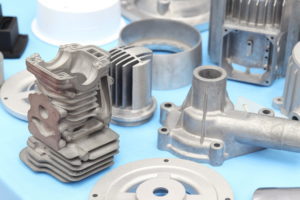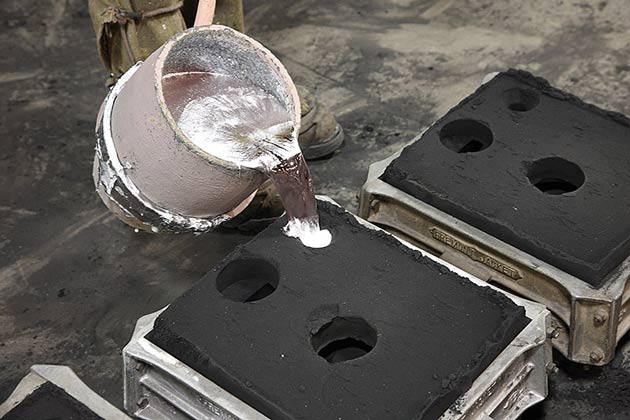Rumored Buzz on Stahl Specialty Company
The 2-Minute Rule for Stahl Specialty Company
Table of ContentsStahl Specialty Company - TruthsStahl Specialty Company - TruthsThe Definitive Guide to Stahl Specialty CompanySome Ideas on Stahl Specialty Company You Should KnowThe Ultimate Guide To Stahl Specialty Company
The subtle distinction depends on the chemical content. Chemical Contrast of Cast Light weight aluminum Alloys Silicon advertises castability by decreasing the alloy's melting temperature level and boosting fluidness throughout spreading. It plays an important function in permitting intricate molds to be filled precisely. In addition, silicon adds to the alloy's toughness and put on resistance, making it important in applications where longevity is crucial, such as automobile parts and engine elements.It also enhances the machinability of the alloy, making it less complicated to refine right into completed products. This way, iron adds to the total workability of light weight aluminum alloys. Copper enhances electric conductivity, making it helpful in electrical applications. It additionally improves deterioration resistance and contributes to the alloy's total stamina.
Manganese adds to the strength of light weight aluminum alloys and improves workability. Magnesium is a light-weight component that offers toughness and impact resistance to light weight aluminum alloys.
It allows the production of light-weight components with exceptional mechanical residential properties. Zinc enhances the castability of light weight aluminum alloys and assists manage the solidification procedure during casting. It boosts the alloy's toughness and firmness. It is often discovered in applications where complex forms and fine details are required, such as ornamental castings and particular auto parts.
Our Stahl Specialty Company Diaries
Due to the fact that aluminum-silicon alloys have great spreading residential or commercial properties, high gas homes, easy procedures, and excellent deterioration resistance, aluminum-silicon alloys are most generally made use of in the die-casting industry in the house and abroad. At the very same time, aluminum-silicon alloys are likewise relatively early and widely recognized alloys created and made use of in die-casting. After continuous study and enhancement, a lot of the existing worldwide mainstream aluminum-silicon alloys have been settled and are nothing greater than A356, A360, A380, ADC12, B390, and A413.
The key thermal conductivity, tensile strength, return stamina, and prolongation differ. Amongst the above alloys, A356 has the highest thermal conductivity, and A380 and ADC12 have the cheapest.

The smart Trick of Stahl Specialty Company That Nobody is Discussing
In precision casting, 6063 is fit for applications where elaborate geometries and top quality surface area finishes are vital. Examples include telecommunication units, where the alloy's remarkable formability allows for streamlined and visually pleasing designs while preserving architectural honesty. Likewise, in the Lighting Solutions market, precision-cast 6063 parts produce elegant and effective lights fixtures that need intricate shapes and excellent thermal performance.
(https://www.pubpub.org/user/frances-howard)
The A360 displays exceptional elongation, making it optimal for facility and thin-walled parts. In precision spreading applications, A360 is fit for sectors such as Customer Electronic Devices, Telecommunication, and Power Devices.

In precision spreading, light weight aluminum 413 here are the findings shines in the Consumer Electronic Devices and Power Tools industries. This alloy's remarkable rust resistance makes it an excellent selection for outdoor applications, ensuring long-lasting, long lasting products in the pointed out industries.
The 7-Second Trick For Stahl Specialty Company
The aluminum alloy you choose will substantially influence both the casting process and the buildings of the final product. Due to the fact that of this, you should make your decision thoroughly and take an informed technique.
Identifying the most ideal light weight aluminum alloy for your application will mean evaluating a large array of features. The very first group addresses alloy characteristics that impact the manufacturing procedure.
The alloy you select for die casting straight influences a number of aspects of the spreading procedure, like just how very easy the alloy is to function with and if it is prone to casting defects. Warm cracking, likewise called solidification breaking, is a regular die spreading issue for aluminum alloys that can cause inner or surface-level tears or splits.
The Of Stahl Specialty Company
Certain aluminum alloys are much more susceptible to warm splitting than others, and your option must consider this. Another typical flaw located in the die casting of aluminum is die soldering, which is when the cast adheres to the die wall surfaces and makes ejection challenging. It can damage both the cast and the die, so you ought to search for alloys with high anti-soldering residential properties.
Deterioration resistance, which is currently a significant characteristic of light weight aluminum, can vary significantly from alloy to alloy and is a necessary characteristic to take into consideration depending on the environmental conditions your product will certainly be subjected to. Put on resistance is an additional property frequently sought in light weight aluminum products and can differentiate some alloys.